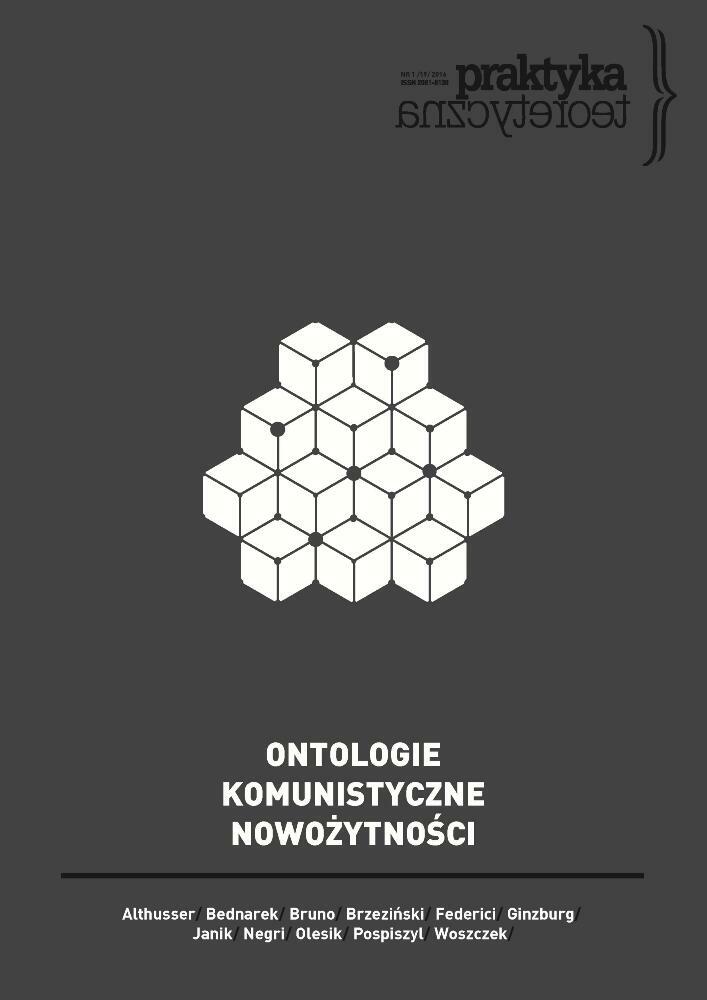Abstract
The text is a critique of the prevalent approach to Cartesianism and its stance towards sensuousness and matter, which is accused of being instrumental and reductive. The author’s aim is to surpass the binary opposition of sensuousness and abstraction, which constitutes the basis for this approach. To that end, Cartesian Meditations are analyzed in the context of the general crisis of experience which affected the Baroque era. Cartesian doubt transforms this sense of crisis into a method, systematically inflating subjective uncertainty. Referring to the baroque technique of anamorphosis, the text demonstrates that the critical uncertainty does not disappear with the introduction of cogito, but is transformed into the basis for the newly constructed rationality. This transformation is based on the relation between formal arbitrariness of Cartesian dualism and the metaphysical arbitrariness of absolute caprice, personified by the figure of the malicious demon. It is as this anamorphic transfiguration that the sensuousness of Cartesian rationality is constituted – and the text systematically traces Cartesian argument in this respect.References
Bal, Mieke. 1999. Quoting Caravaggio: Contemporary Art and Preposterous History. Chicago: The University of Chicago Press.
Baltrušaitis, Jurgis. 2009. Anamorfozy, albo thaumaturgus opticus. Tłum. Tomasz Stróżyński. Gdańsk: Słowo/obraz terytoria. Benjamin, Walter. 2009. The Origin of German Tragic Drama. Tłum. John Osborne. London–New York: Verso.
Blumenberg, Hans. 1985. The Legitimacy of Modern Age. Tłum. Robert M. Wallace. Cambridge: The MIT Press.
Bordo, Susan R. 1987. The Flight to Objectivity: Essays on Cartesianism and Culture. New York: State University of New York Press.
Braidotti, Rosi. 2011. Nomadic Subjects: Embodiment and Sexual Difference in Contemporary Feminist Theory. New York: Columbia University Press.
Bryson, Norman i Mieke Bal. 1991. „Semiotics and Art History.” The Art Bulletin 73: 174–208.
Buci-Glucksmann, Christine. 2013. The Madness of Vision: On Baroque Aesthetics. Tłum. Dorothy Z. Baker. Athens: Ohio University Press.
Derrida, Jacques. 2004. „Cogito i historia szaleństwa.” W Pismo i różnica. Tłum. Krzysztof Kłosiński. Warszawa: Wydawnictwo KR.
Descartes, René. 2001. Medytacje o pierwszej filozofii. Zarzuty uczonych mężów. Rozmowa z Burmanem. tłum. Kazimierz i Maria Ajdukiewiczowie. Kęty: Antyk.
Funkenstein, Amos.1985. Theology and Scientific Imagination. Princeton: Princeton University Press.
Gaukroger, Stephen. 2008. The Emergence of Scientific Culture: Science and The Shaping of Modernity 1210–1685. Oxford: Oxford University Press.
Greenberg, Mitchell. 2001. Baroque Bodies: Psychoanalysis and the Culture of French Absolutism. Ithaca: Cornell University Press. Haraway, Donna. 1985. „A Manifesto for Cyborgs: Science, Technology and Socialist Feminism in the 1980s.” Socialist Review 15(2): 65–107.
Harbison, Robert. 2000. Reflections on Baroque. London: Reaktion Books.
Judovitz, Dalia. 1993. „Vision, Representation and Technology in Descartes.” W Modernity and the Hegemony of Vision, red. David Michael Levin. Berkeley: University of California Press.
Judovitz, Dalia. 2001. The Culture of the Body: Genealogies of Modernity. Ann Arbor: University of Michigan Press.
Kaplan, Caren. 1996. Questions of Travel: Postmodernist Discourses of Displacement. Durham– London: Duke University Press.
Lambert, Gregg. 2004. The Return of the Baroque in Modern Culture. London–New York: Continuum.
Levine, George Lewis. 2002. Dying to Know: Scientific Epistemology and Narrative in Victorian England. Chicago: University of Chicago Press.
Maravall, Jose Antonio. 1986. The Culture of the Baroque: The Analysis of a Historical Structure. Tłum. Terry Cochran. Minneapolis: University of Minessota Press.
Massey, Lyle. 2007. Picturing Space, Displacing Bodies: Anamorphosis in Early Modern Theories of Perspective. University Park, PA: The Pensylvania State University Press.
Merchant, Carolyn. 1980. The Death of Nature: Women, Ecology and Scientific Revolution. London: Wildwood House.
License
“Theoretical Practice” seeks to put into practice the idea of open access to knowledge and broadening the domain of the commons. It serves the development of science, thinking and critical reflection. The journal is published in open-access mode under the CC-BY-NC-SA 4.0 license (detail available here: http://creativecommons.org/licenses/by-nc-sa/4.0/). Articles published in the journal may be freely distributed, stored, printed and utilized for academic and teaching purposes without restrictions.
They should not be, however, used for any commercial purposes or be reconstructed into derivative creations. Access to the journal may not be limited or offered for a fee by any third party.
Prospective authors are obliged to fill in, sign and send back the publishing contract compliant with the CC licencing. [PL.pdf, PL.doc, EN.pdf,EN.doc].
According to this contract, authors grant the journal a non-exclusive right to publish their work under the creative commons license (CC-BY-NC-SA 4.0) without any financial obligation on both sides of the contract.
Before submission authors should make sure that derivative materials they use are not protected by copyright preventing their non-commercial publication. Authors are responsible for any respective copyright violations.
